January, 1948
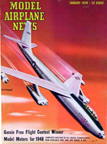
Boeing B-47 "Stratojet"
Model Airplane News Cover Art for January, 1948
by Jo Kotula
Click to Enlarge
The Boeing B-47 Stratojet was a medium-range jet bomber primarily designed for penetrating the airspace of the Soviet Union. A major innovation in post-World War II combat jet design, it helped lead to the development of modern jet airliners. While the B-47 never saw major combat use, it remained a mainstay of the U.S. Air Force's Strategic Air Command (SAC) during the 1950s and early 1960s.
The B-47 began with a 1943 U.S. Army Air Forces requirement for a jet bomber and reconnaissance aircraft that could reach Nazi Germany in the event that Great Britain fell. The next year, the requirement evolved into a formal request for a bomber with a specified speed of 500 mph, a range of 3,500 miand a service ceiling of 40,000 ft. It envisioned using the General Electric TG-180 turbojet engine, then in development.
The XB-47 was designed to carry a crew of three in a pressurized forward compartment: a pilot and copilot, in tandem, in a long fighter-style bubble canopy, and a navigator in a compartment in the nose. The copilot doubled as tail gunner, and the navigator as bombardier. The bubble canopy could pitch up and slide backward, but as the cockpit was high off the ground, crew entrance was through a door and ladder on the underside of the nose.
Total bombload capacity was to be 10,000 lb. Production aircraft were to be equipped with state-of-the-art electronics for navigation, bombing, countermeasures, and turret fire control. The USAF Strategic Air Command operated B-47 Stratojets (B-47s, EB-47s, RB-47s and YRB-47s) from 1951 through 1965.
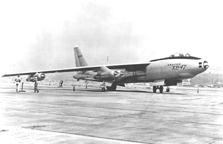
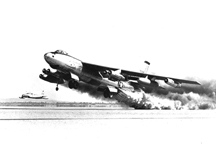
The Boeing B-47 Stratojet
left: the XB-47 Prototype
right: B-47 Using Rocket-Assisted Take-Off (RATO)
Click to Enlarge
The B-47 was so fast that in the early days the aircraft set records with ease. The aircraft handled well in flight, with a fighter-like light touch to the controls. The large bubble canopy for the pilot and co-pilot enhanced the fighter-like feel of the aircraft with improved vision, but the design would also cause variations in internal temperatures for the 3-man crew.
It took the Air Force until 1953 to turn the B-47 into an operational aircraft. The aircraft was sluggish on takeoff and too fast on landings, a very unpleasant combination. . Improved training led to a good safety record, and few crews felt the aircraft was unsafe or too demanding. Here is a historical video about the B-47:
Jo Kotula revisited this airplane in the "Box Art" for the Aurora kit for the Boeing B-47 Stratojet.
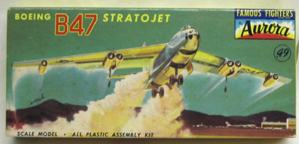
Aurora Plastic Model of the Boeing B-47 Stratojet
Artwork by Jo Kotula
Click to Enlarge
In addition to the cover of Model Airplane News, this airplane was also featured in the WINGS "Friend or Foe" trading card series of the early 1950s
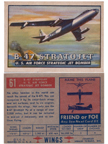
Trading card representation of the Boeing B-47 Stratojet
Click Here to see all 200 cards in the series
Click to Enlarge
The kit shown below is also part of the Simplex series. If the balsa frame is not absolutely perfect, the model will look horrible when covered with paper.
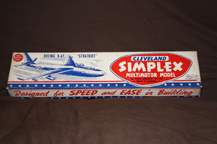
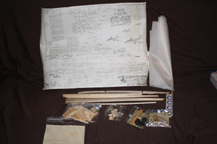
The Simplex B-47 Kit
Click to Enlarge
This led many modelers to begin to cover their planes with balsa wood planking. This made the models quite heavy and unflyable. Several primitive model jet engines were available during the 1950s, but jet flying was the hobby of comparatively few. I attended many meets and never saw a multi-engine jet-powered model.
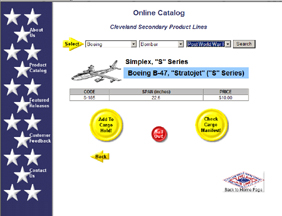
Boeing B-47 Stratojet at the Cleveland Site
You can buy the plans and patterns that will enable you to make this model right now. Click Here to go to the exact location on the Cleveland Website to get them.
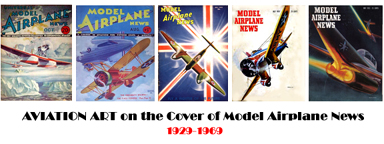
Click to go back and select another cover.
Counter for the Entire Site (not just this page..)
Home | About Lindy | Last Week's Reviews | Upcoming Events | 1940s Collecibles
The Guide - Establishments - Travel - Accessories
Music | Links | Photo Gallery | Extras | Contact